Technology tools for sobriety support
August 1, 2025
Harnessing Digital Innovations in Addiction Recovery

The Transformative Role of Technology in Sobriety Maintenance
With the advent of digital technology, addiction recovery has entered a new era where accessible, personalized, and real-time support is now readily available. From mobile apps and online communities to telehealth services and wearable monitoring devices, technology plays a crucial role in promoting sobriety, enhancing treatment engagement, and preventing relapse. This article explores the multitude of digital resources supporting individuals on their recovery journey, the integration of these tools with traditional care, and emerging innovations shaping the future of addiction treatment.
Digital Tools Supporting Sobriety and Recovery
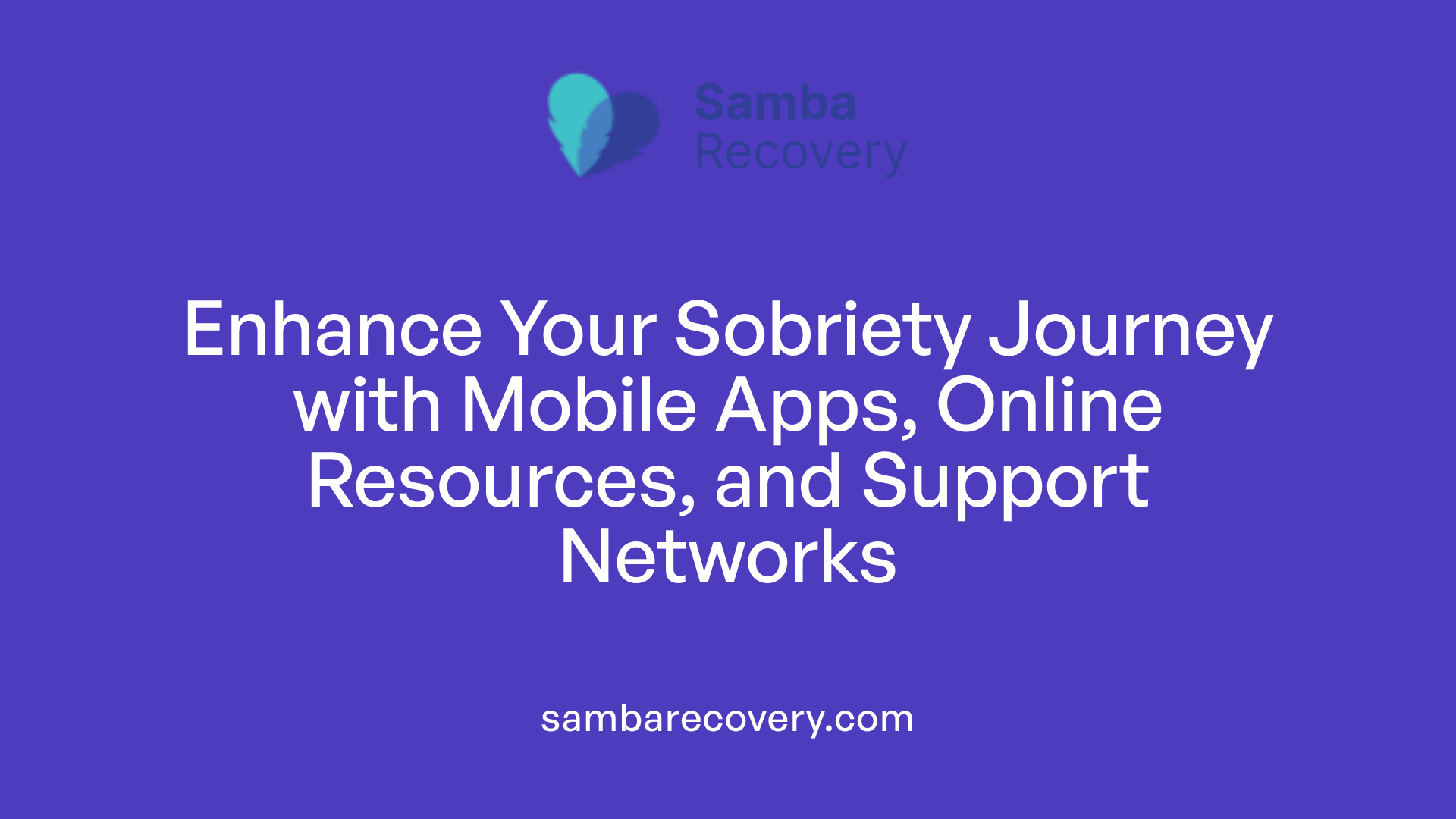
What are some digital tools and resources that support sobriety and recovery?
In recent years, technology has become an essential component of addiction recovery, offering accessible, private, and personalized support options. Mobile applications play a crucial role, helping users track their progress, manage cravings, and stay motivated. Popular apps such as IAmSober, Sober Tool, Nomo, and Sober Time enable individuals to log sobriety days, celebrate milestones, and monitor financial savings resulting from sobriety. These tools foster motivation and accountability, making recovery more engaging and manageable.
Beyond self-monitoring tools, structured treatment programs like Pear reSET, approved by the FDA, provide comprehensive 12-week curricula focusing on behavioral change, which significantly improve abstinence rates. Sober Grid is another influential app that builds community support through profiles, check-in features, and GPS-based connections. This fosters social support for those seeking to connect with sober peers nearby or worldwide.
The SAMHSA National Helpline is a fundamental resource accessible at any time. It offers free, confidential, 24/7 treatment referral and information services in English and Spanish. Callers are connected to local treatment centers, support groups, and community organizations. Additionally, a text messaging component enables users to send their ZIP code for help near them, making access even more immediate and convenient.
Educational resources are also vital. Websites like Libertas provide crucial information on signs of substance use and available support options. These digital tools do not replace traditional treatment but rather complement it by enhancing motivation, providing social connection, and broadening access to care.
The integration of technology into recovery strategies demonstrates the evolving landscape of addiction support. Combining these digital tools with professional therapy and community engagement ensures a holistic and sustainable approach to overcoming substance use disorders.
How do digital resources enhance sobriety and recovery?
Digital tools support recovery by overcoming logistical barriers such as time and cost constraints that often hinder access to traditional services. They enable continuous support through instant access to educational content, peer communities, and professional help.
Apps like Sober Time and IAmSober serve as accessible aftercare tools, allowing individuals to stay connected to their sobriety journey from anywhere. Online support communities and virtual meetings, available via platforms like InTheRooms or SMART Recovery Online, foster a sense of belonging and shared experience.
Furthermore, telehealth platforms widen the reach of professional addiction treatment. Video conferencing tools allow for remote counseling, which is especially beneficial for individuals in rural or underserved areas. Digital therapeutics like computer-assisted therapies and web-based skills training programs, such as the community reinforcement approach, help develop cognitive-behavioral skills necessary for sustained recovery.
Emerging technologies like wearable devices enable real-time physiological monitoring, helping detect early signs of relapse or stress. Artificial intelligence and machine learning are used to personalize recovery plans, predict relapse risks, and automate reminders for medication or appointments.
Educational resources, including podcasts and online courses, further support learning about addiction science and coping strategies. These digital innovations foster a more proactive, informed, and connected approach to recovery.
Examples of Digital Tools and Their Features
| Tool/Platform | Main Features | Purpose |
|---|---|---|
| IAmSober | Sobriety milestones, money saved, motivational alerts | Tracking progress, motivation |
| Sober Tool | Daily check-ins, sobriety clock, craving management | Monitoring and managing cravings |
| Nomo | Habit tracking, community features, motivational content | Maintaining routines and peer support |
| Sober Time | Customizable sobriety clock, notifications | Motivational support |
| Pear reSET | FDA-approved program, structured curriculum, behavioral change | Formal treatment enhancement |
| Sober Grid | Community profiles, GPS connection, social support | Peer connection and community building |
| SAMHSA Helpline | Free treatment referrals, confidential, 24/7 availability | Connecting to local resources |
| Libertas | Educational info, signs of substance use, support options | Awareness and early intervention |
The Importance of Combining Digital and Traditional Approaches
While digital tools have revolutionized access to support, they work best when integrated with professional care and community involvement. Apps and online resources offer immediate support, daily motivation, and educational insights, but they are most effective when complemented by therapy sessions, peer meetings, and family support.
The combination of technology and human interaction fosters a comprehensive recovery environment. It allows for personalized, flexible, and continuous care, helping individuals navigate the challenges of sobriety with greater confidence and resilience.
Digital tools are not just supplementary; they are transforming recovery by making support more accessible, private, and sustainable—elements crucial for long-term sobriety success. As the landscape continues to evolve, innovative technologies promise even more tailored and effective recovery supports in the future.
Practical Daily Recovery Tools and Habits
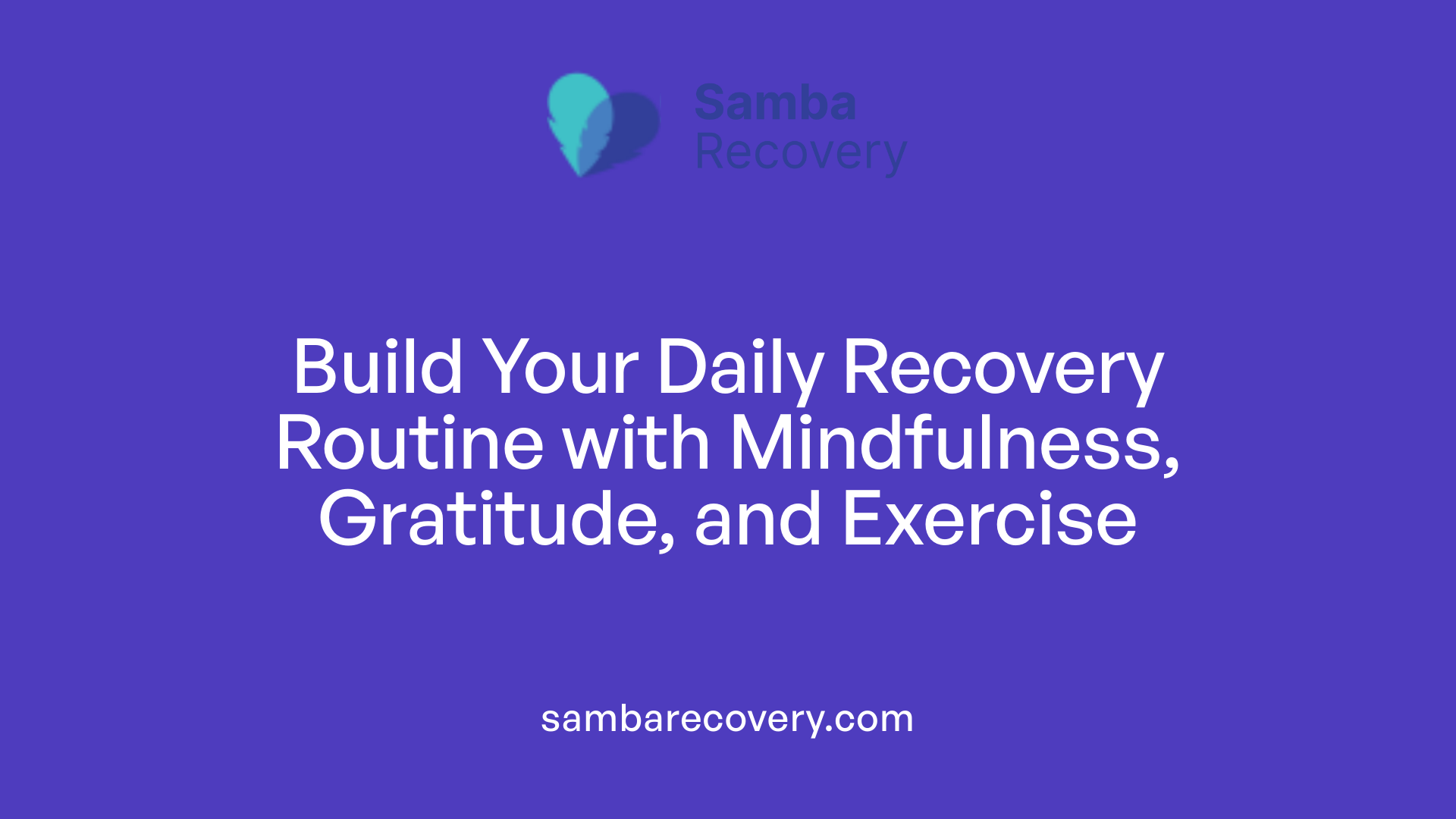
What are some practical recovery tools that individuals can use daily?
Implementing daily habits can significantly support recovery efforts. One of the most effective tools is practicing mindfulness exercises. Techniques such as deep breathing, guided meditation, and body scans help individuals become more comfortable with discomfort and reduce stress levels.
Setting boundaries is another important daily practice. This involves defining personal limits on social media, work, and technology use to protect mental and emotional well-being. Maintaining clear boundaries helps prevent triggers and promotes a healthy mental state.
Engaging in gratitude practices can foster positivity and resilience. Daily reflection on things one is thankful for can combat anxiety and depression, helping individuals develop a more optimistic outlook. Keeping a gratitude journal or using apps that prompt gratitude exercises is common.
Alongside mental exercises, establishing a healthy routine is crucial. Eating nutritious meals, getting enough sleep, and engaging in regular physical activity support overall wellness. Exercise, even in small amounts like walking or yoga, releases endorphins that boost mood.
Participating in social and community activities provides emotional support and fosters connection. Attending support groups, volunteering, or simply spending time with loved ones strengthens a sense of belonging.
Self-care activities such as prayer, meditation, or spiritual reflection can help reinforce inner strength. Integrating these into daily schedules promotes emotional stability. Reaching out to trusted supports, whether professionals or community members, also plays a vital role.
Incorporating these habits creates a comprehensive self-care approach that helps sustain recovery. The combination of mental, emotional, and physical practices builds resilience and prepares individuals for challenges ahead.
Integrating Technology into Addiction Treatment and Prevention
How can technology be integrated into addiction treatment and relapse prevention?
Technology has revolutionized addiction treatment by enhancing accessibility, personalization, and ongoing support for individuals at various stages of recovery. Digital platforms such as mobile apps and websites offer evidence-based programs like SMART Recovery, which provide practical tools, exercises, and educational resources rooted in Cognitive Behavioral Therapy (CBT). These programs help users manage cravings, modify unhelpful thoughts, and develop healthier coping strategies.
Virtual meetings and online communities are critical components of modern addiction recovery. They facilitate peer support, foster a sense of belonging, and help reduce the stigma often associated with addiction. Online forums and support groups—like those operated by SMART Recovery, AA, and other mutual help organizations—allow individuals to connect from the comfort of their homes, making ongoing support more accessible and flexible.
Personalized interventions and tracking tools further improve recovery outcomes. Mobile applications such as 'I Am Sober,' 'Nomo,' and 'Sober Grid' enable users to set sobriety milestones, monitor progress, and receive motivational prompts. Wearable devices and digital logs track physiological data, providing real-time feedback and alerting users or clinicians to potential relapse risks.
Moreover, these technological solutions are designed to suit diverse populations, including veterans, youth, LGBTQIA+ individuals, and people in rural or underserved areas. The availability of online therapy, telehealth services, and culturally sensitive content ensures that support adapts to individual needs and circumstances.
Ultimately, integrating technology into addiction treatment allows for tailored, continuous, and stigma-free support that complements traditional face-to-face care. It enables individuals to access resources anytime and anywhere, fostering a more sustainable and engaging recovery journey.
Tools for Relapse Prevention and Long-term Sobriety
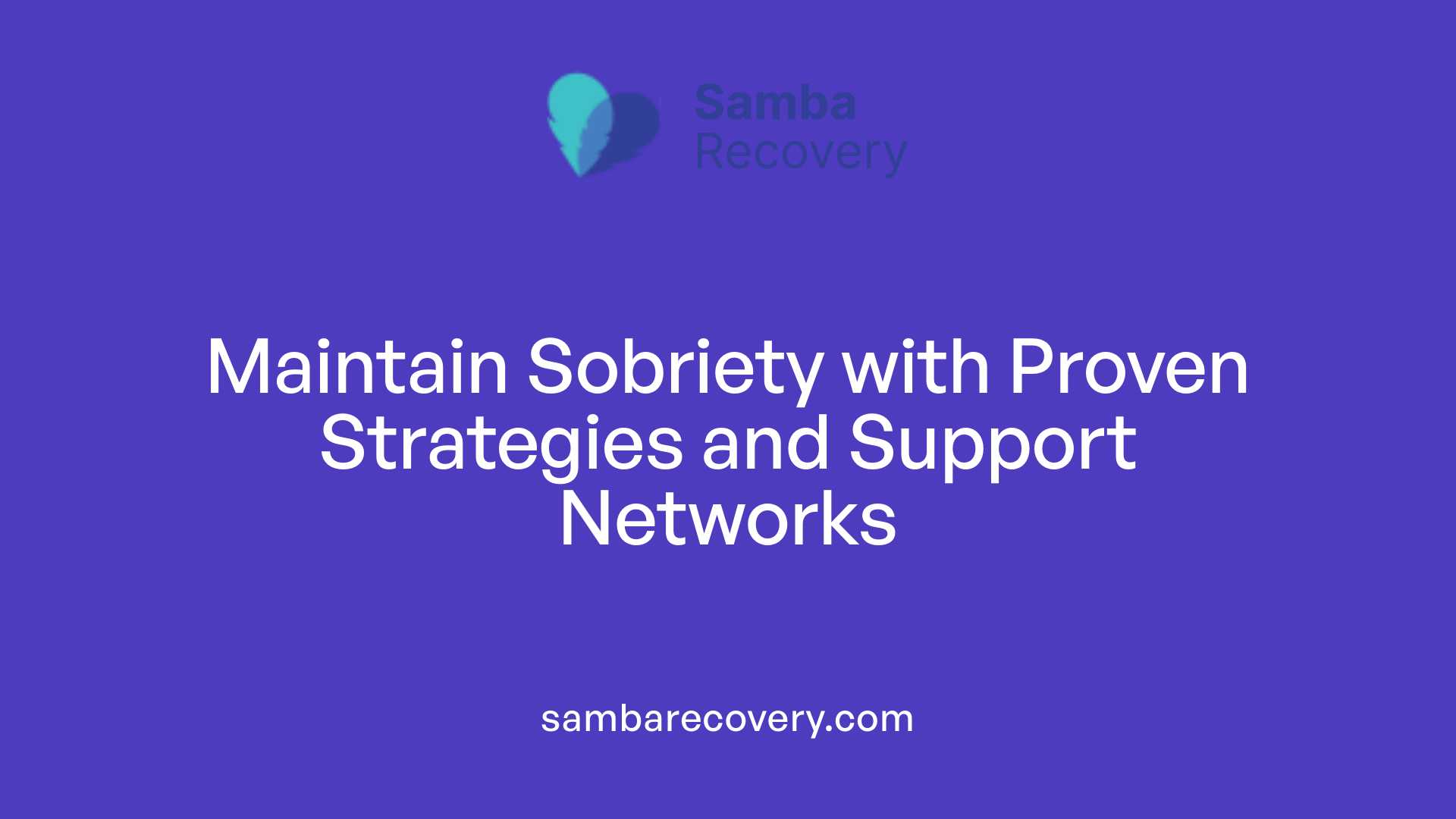
What are effective tools for relapse prevention?
Relapse prevention is a vital aspect of maintaining long-term sobriety. Effective strategies include creating a personalized aftercare plan that integrates continuous support from therapy, peer support groups like Alcoholics Anonymous (AA) or SMART Recovery, and sober living arrangements. These components provide ongoing encouragement and accountability.
Maintaining healthy self-care practices also plays a significant role. This involves following a nutritious diet, prioritizing restorative sleep, engaging in regular physical activity, and utilizing stress management techniques such as yoga, meditation, or acupuncture. These habits help control internal triggers like emotional distress or cravings.
Managing external triggers is equally important. This means avoiding environments or situations associated with substance use, removing drug paraphernalia from one's surroundings, and steering clear of individuals who may induce temptation. Mind-body techniques, including deep breathing exercises and grounding methods, assist in managing biological cravings and emotional upheavals.
Building a strong sober support network is crucial. Connecting with peers through community groups, online forums, or social activities helps foster a sense of belonging and shared purpose.
Furthermore, collaboration with healthcare professionals enables the development of tailored relapse prevention strategies. Regular check-ins, personalized therapy, and medication management (if applicable) ensure that interventions adapt to changing needs and challenges.
Overall, combining these tools forms a comprehensive approach that empowers individuals to sustain their recovery over the long term.
How digital and community tools support ongoing recovery
Digital tools play an expanding role by providing accessible, discreet, and customizable support. Mobile apps track sobriety milestones, offer motivational messages, and facilitate peer connection. Virtual therapy sessions and online support groups increase access, especially for those in remote or underserved areas.
Community engagement remains foundational. Participating in local meetings, volunteer activities, and online communities can reinforce commitment, provide accountability, and reduce feelings of isolation.
By integrating technology, professional guidance, and community involvement, individuals build resilient routines that support lasting sobriety.
Evidence-Based Tools in Recovery Programs like SMART Recovery
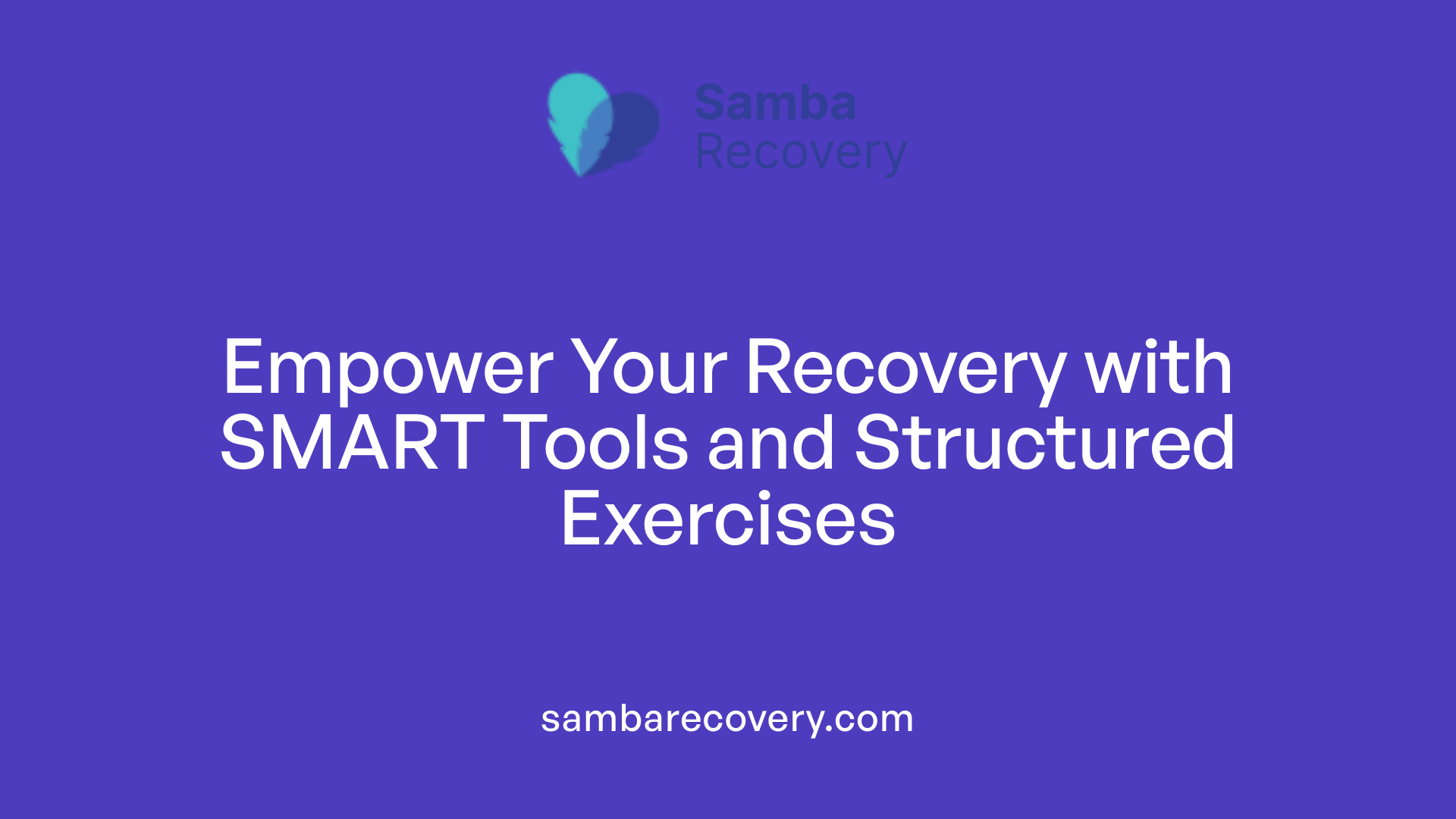
What are smart tools used in recovery programs like SMART Recovery?
SMART Recovery emphasizes the use of scientifically supported tools grounded in Cognitive Behavioral Therapy (CBT) principles. These tools are designed to empower individuals, foster self-management, and promote lasting change.
One core component is the use of worksheets and structured exercises that help participants explore their thoughts, feelings, and behaviors related to addiction. Commonly used worksheets include the Problem-Solving worksheet, ABC (Antecedent-Behavior-Consequence) worksheets, and the Change Plan—a step-by-step guide to identifying and implementing behavioral goals.
To help individuals manage urges and cravings, SMART Recovery incorporates Urge Logs. These logs enable participants to track the intensity, frequency, and triggers of urges, fostering awareness and facilitating coping strategies.
Additional tools include the Hierarchy of Values (HOV), which helps individuals clarify what matters most to them and align their actions accordingly. The Cost Benefit Analysis (CBA) encourages weighing the pros and cons of behaviors to reinforce motivation for change.
Many participants use the Disputing Unhelpful Beliefs tool (DISARM) to challenge and reframe negative thoughts that can sabotage recovery efforts. The Problem-Solving worksheet assists in developing practical strategies for dealing with obstacles, while the Change Plan guides goal setting and action steps.
Overall, these practical, evidence-based tools are integrated into SMART Recovery’s structured programs, empowering individuals to build resilience, develop healthier habits, and sustain sobriety.
| Tool Name | Purpose | Focus Area | Details |
|---|---|---|---|
| Problem-Solving Worksheet | Develop coping strategies | Behavior change | Guides systematic problem resolution |
| ABC Worksheet | Understand triggers | Thought and emotion management | Analyzes antecedents, behaviors, consequences |
| Change Plan | Set and achieve goals | Behavior modification | Step-by-step action plan |
| Urge Log | Track cravings | Urge and craving management | Monitor and recognize triggers |
| Hierarchy of Values | Clarify motivations | Values and purpose | Helps align actions with core values |
| Cost Benefit Analysis | Weigh options | Decision making | Supports motivation through pros and cons |
| Disputing Unhelpful Beliefs (DISARM) | Challenge negative thoughts | Cognitive restructuring | Reframes unhelpful beliefs |
How do these tools facilitate personal growth?
By consistently applying these tools, individuals in recovery can better understand their behaviors, challenge self-defeating thoughts, and develop healthier habits. The worksheets and tracking mechanisms foster accountability and reinforce positive change.
The structured approach encourages active participation in recovery, building skills that transcend immediate cravings and contribute to long-term resilience.
In conclusion, SMART Recovery’s use of practical, evidence-based tools empowers individuals to take charge of their recovery journey, promoting self-efficacy and reducing reliance on traditional or stigmatizing models. These tools serve as foundational elements in fostering sustainable behavioral change and emotional well-being.
Emerging Technologies and Future Directions in Recovery
What are emerging tools and future developments in recovery technologies?
Recent advances in technology are transforming how people access and benefit from addiction recovery resources. Sensor technology and machine learning are at the forefront of these innovations, offering real-time monitoring and personalized feedback.
Wearable devices such as Fitbits, Apple Watches, and specialized biochemical sensors play a crucial role in health monitoring. These devices track vital signs like heart rate, sleep patterns, physical activity, and physiological markers. By continuously collecting this data, they enable timely interventions, alerting users or clinicians to health changes that might signal stress, cravings, or relapse risks.
Virtual Reality (VR) technologies are increasingly used to replicate real-world environments and triggers. Through controlled exposure, individuals can practice coping skills, manage cravings, and build resilience in a safe setting. For example, VR scenarios can simulate social situations or places associated with previous substance use, helping users develop effective responses.
Artificial Intelligence (AI) and machine learning are powerful tools for personalizing treatment plans. These technologies analyze extensive patient data, identify patterns, and generate tailored recovery strategies. AI can also predict relapse risks based on behavioral and physiological indicators, allowing clinicians to intervene proactively.
The integration of these cutting-edge tools points toward a future where recovery ecosystems are highly individualized and accessible. Devices and algorithms can adapt to changing needs, providing support that is both precise and responsive.
In summary, emerging tools like health-monitoring wearables, VR environments, and AI-driven analytics collectively are setting the stage for more effective, personalized, and technology-enhanced recovery journeys. These innovations promise to improve outcomes, extend support beyond clinical settings, and empower individuals to maintain sobriety with confidence.
| Technology | Function | Future Potential |
|---|---|---|
| Wearable Devices | Health monitoring (heart rate, sleep, physiological markers) | Timely alerts and personalized insights |
| Virtual Reality | Trigger exposure and coping skills practice | Enhanced real-world simulations for relapse prevention |
| Artificial Intelligence | Data analysis and personalized treatment planning | Predictive analytics and tailored interventions |
| Integrated Ecosystems | Comprehensive, adaptable recovery support | Seamless, 24/7 accessible care |
This convergence of innovation underscores a future where technology not only supports but actively transforms addiction recovery, making it more efficient, engaging, and personalized.
The Role of Support Networks and Community Engagement
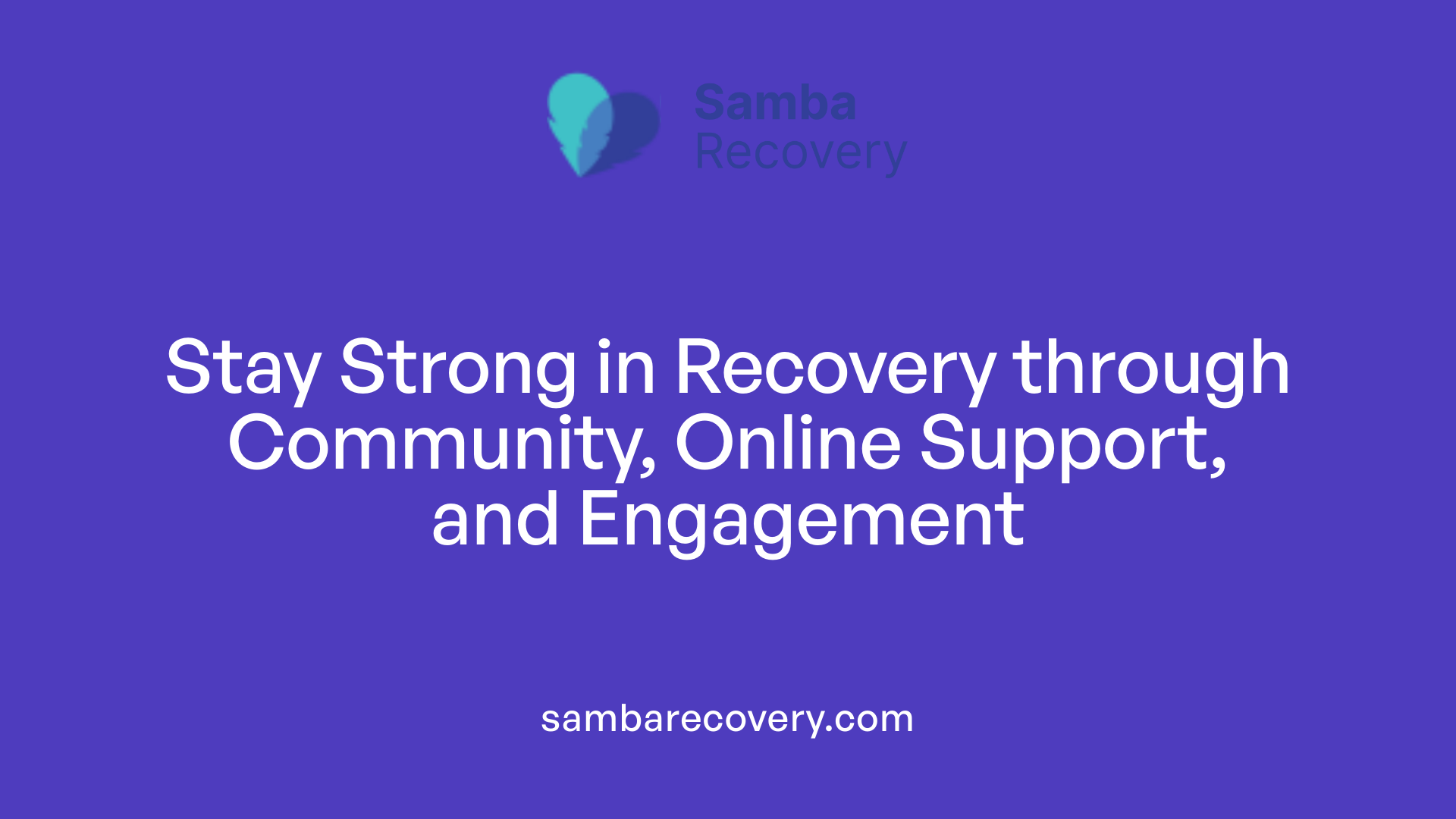
How can support networks assist in recovery?
Support networks play a crucial role in helping individuals maintain sobriety and build resilience. They offer emotional encouragement, valuable shared experiences, accountability, and a sense of belonging that may otherwise be lacking. Online support groups, such as Reddit’s r/stopdrinking, In The Rooms, and dedicated apps like Sober Grid or SMART Recovery, enable connection across different geographical areas, creating a broad community of people committed to recovery.
These networks provide safe spaces for individuals to share their struggles, celebrate achievements, and exchange effective coping techniques. This constant support enhances motivation and boosts self-efficacy, which are critical for long-term sobriety.
Social media platforms also serve as tools to promote positive habits and disseminate educational content. Many recovery stories and motivational messages are shared on these platforms, inspiring others to stay committed to their journey.
However, engaging with social media requires boundaries. It’s important to avoid exposure to triggering content, peer pressure, or negative influences that could jeopardize progress. Managing online interactions thoughtfully strengthens the benefits of community support.
In essence, well-structured support networks—whether through online groups, community forums, or social media—are vital resources in sustaining recovery efforts. These communities foster continuous motivation, provide accessible information, and create a safety net during challenging times.
Supporting Recovery Through Innovation and Community
The integration of technology in addiction recovery has revolutionized access to support, personalized care, and relapse prevention strategies. Digital tools—ranging from mobile apps and online communities to wearable devices and AI—offer unprecedented opportunities for individuals to maintain sobriety, monitor their progress, and engage with supportive networks. When combined with traditional treatment methods such as therapy, mutual help groups, and community involvement, these innovations create a comprehensive and accessible recovery ecosystem. As future technologies like virtual reality and machine learning continue to evolve, the landscape of addiction recovery will become even more tailored and effective. Ultimately, embracing digital innovations alongside human support fosters resilience, hope, and sustained sobriety for those on their recovery journey.
References
- National Helpline for Mental Health, Drug, Alcohol Issues - SAMHSA
- Recovery Through Technology: Apps, Podcasts, and Online Support ...
- LEVERAGING TECHNOLOGY TO ENHANCE ADDICTION ...
- SMART Recovery Toolbox
- Recovery Technology Guide
- Sobriety Apps for Recovering Addicts - The Recovery Village
- How to Use Digital Tools to Support Addiction Recovery
- Exploring the Impact of Technology on Addiction Recovery
- Harnessing Technology for Recovery: Digital Tools for Sobriety
- Technology in Recovery: Best Apps and Tools to Support Sobriety
About Samba Recovery
Start your treatment today!

Featured Articles
Read the latest addiction news and recovery tips from our blog.
Samba Recovery never miss an opportunity
Substance use may be part of your story, but it doesn’t have to be the rest of it. Sustainable recovery is possible and the best version of yourself is waiting at our Atlanta and Savannah, Georgia addiction recovery centers.
We’ll help you learn that the opposite of addiction is connection. We’ll give you skills to discover your self-worth and show you the tools for a life of hope and promise.
Contact us today!
We accept most major insurances
We partner with most major insurances, enabling you to access premier therapy services.










































































































